Abstract
This study examines the relationship between anger expression and life stress in a nationally representative sample of black adults. Recent research of mostly white subjects has shown that anger-hostility, one of the components of the Type A behavioral pattern, is an important predictor of health problems. The findings of the present inquiry indicate that anger-hostility is an important predictor of life stress, and that people with higher levels of anger conflict are more likely to experience negative life events. Moreover, negative life events and anger are shown to be independent predictors of health problems among blacks. The implications of these results for future studies of the health of black Americans are discussed.
Full text
PDF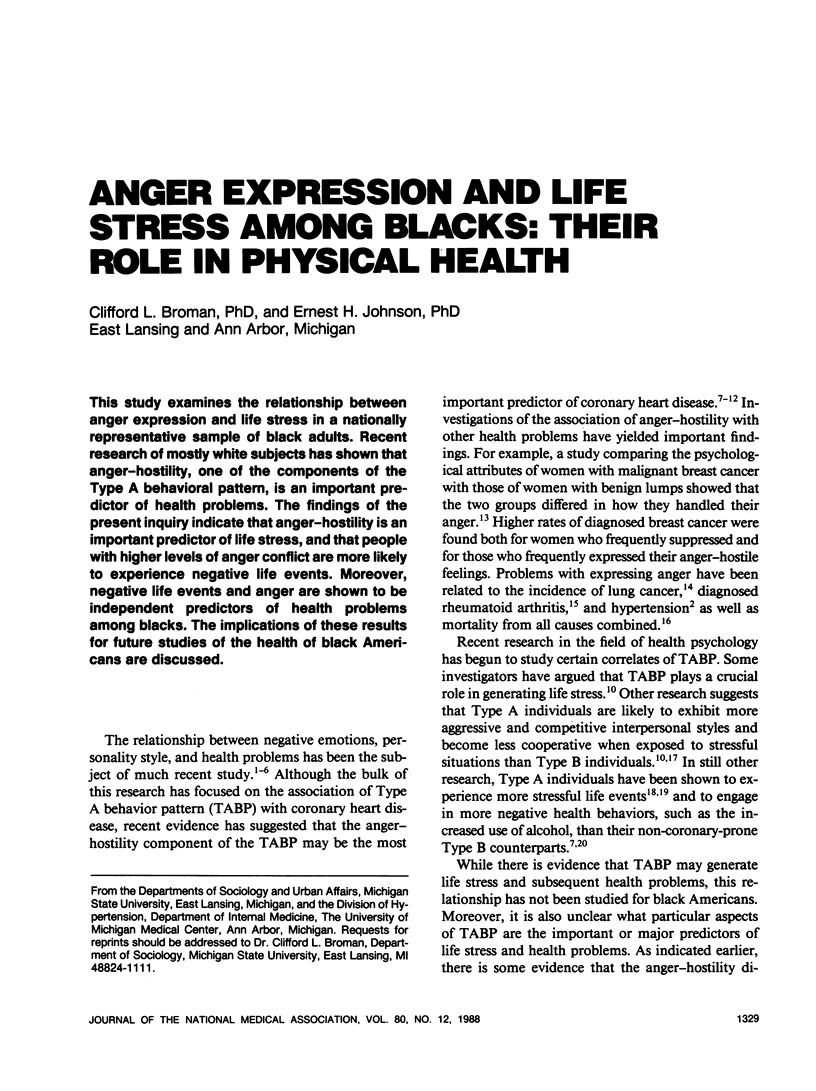
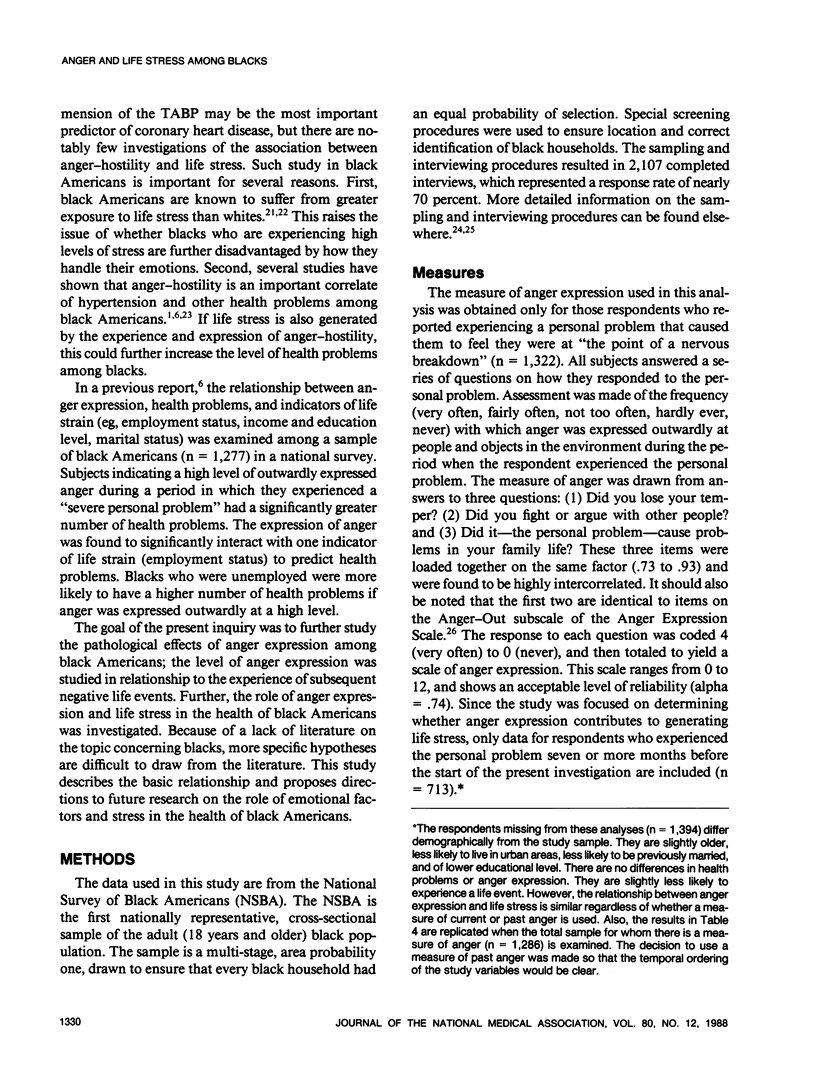
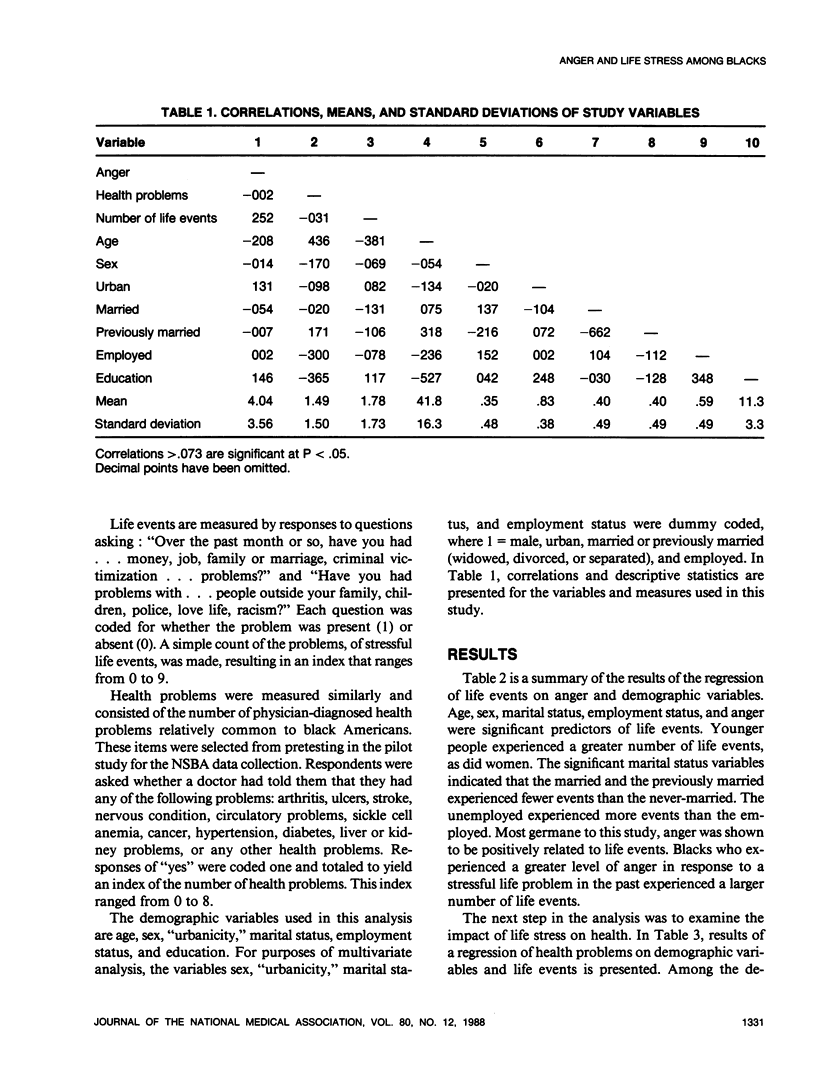
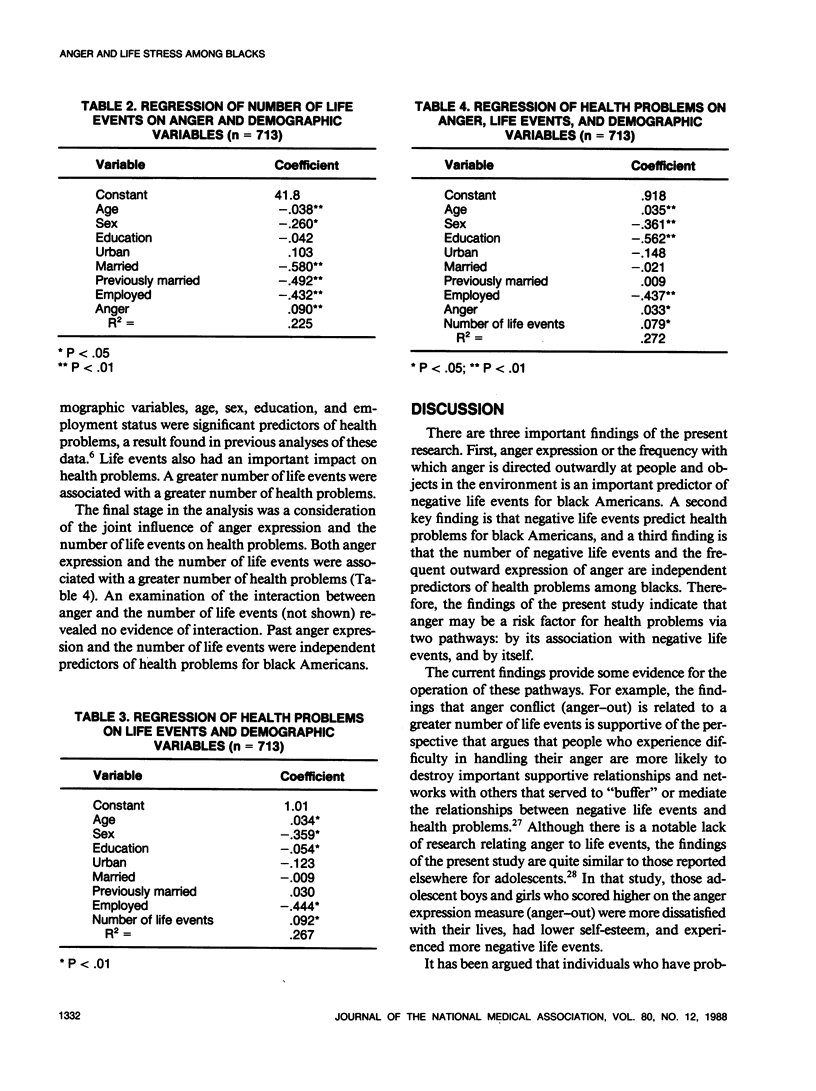
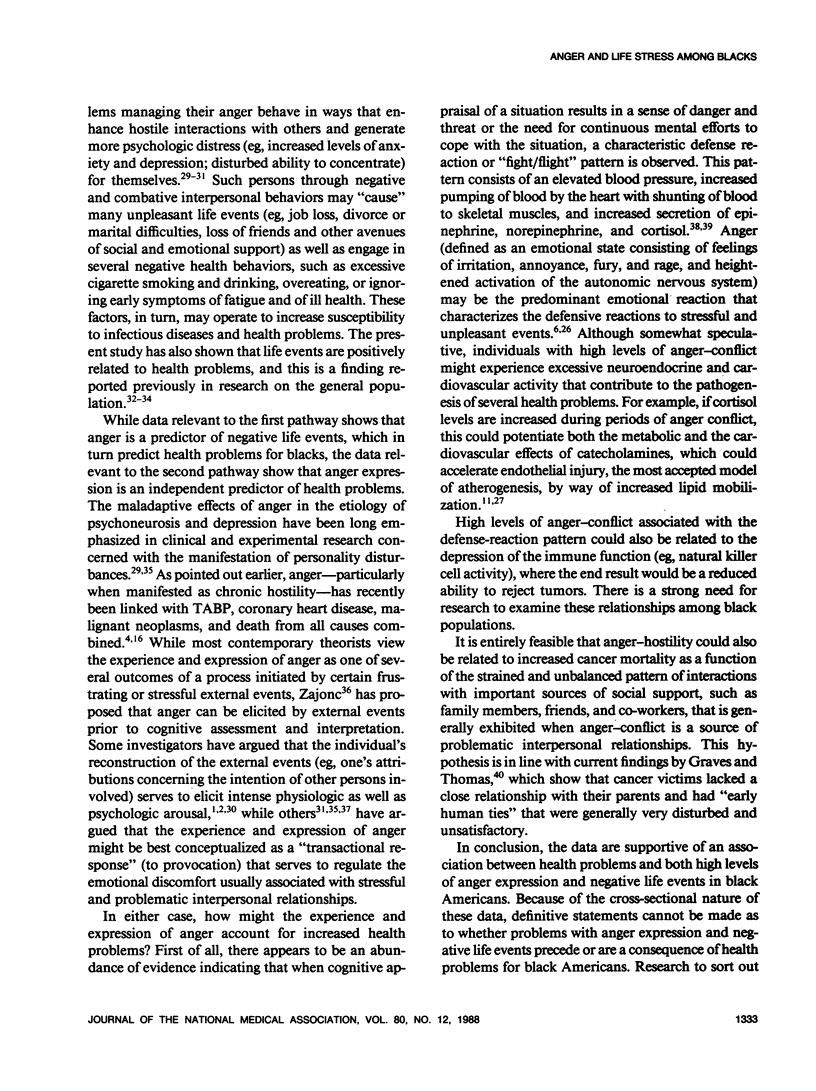
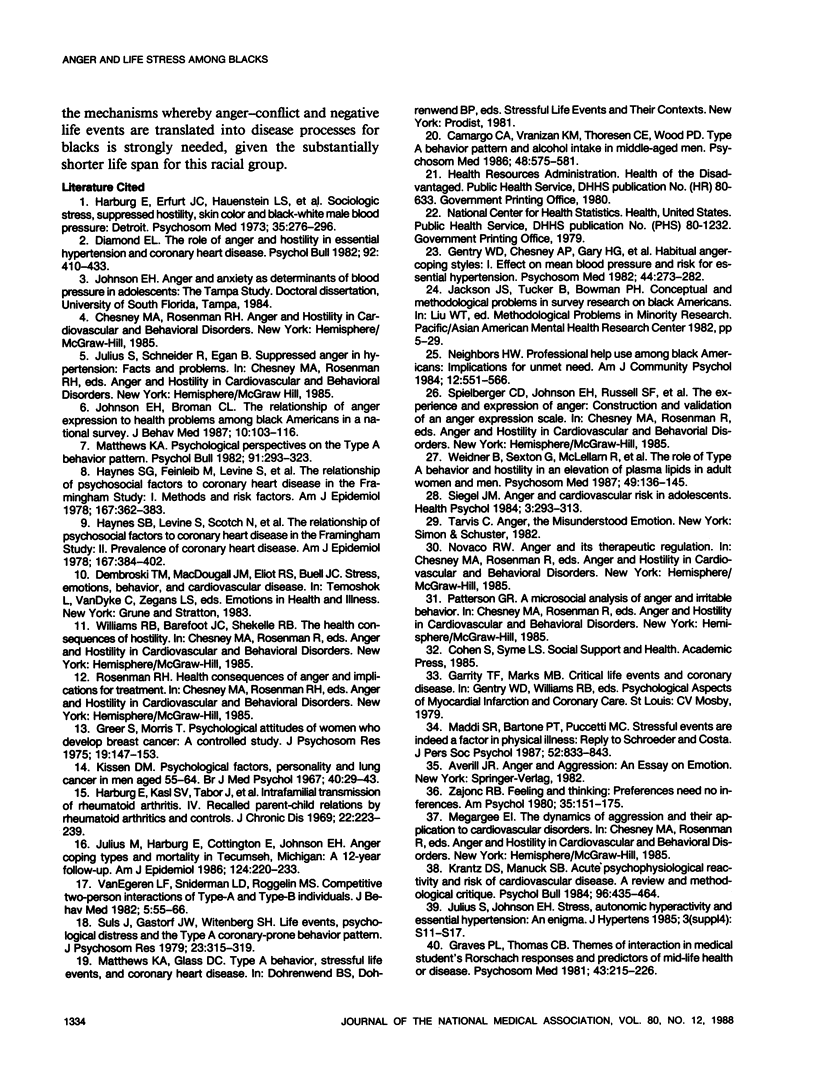
Selected References
These references are in PubMed. This may not be the complete list of references from this article.
- Camargo C. A., Jr, Vranizan K. M., Thoresen C. E., Wood P. D. Type A behavior pattern and alcohol intake in middle-aged men. Psychosom Med. 1986 Nov-Dec;48(8):575–581. doi: 10.1097/00006842-198611000-00004. [DOI] [PubMed] [Google Scholar]
- Diamond E. L. The role of anger and hostility in essential hypertension and coronary heart disease. Psychol Bull. 1982 Sep;92(2):410–433. [PubMed] [Google Scholar]
- Graves P. L., Thomas C. B. Themes of interaction in medical students' Rorschach responses as predictors of midlife health or disease. Psychosom Med. 1981 Jun;43(3):215–225. doi: 10.1097/00006842-198106000-00003. [DOI] [PubMed] [Google Scholar]
- Greer S., Morris T. Psychological attributes of women who develop breast cancer: a controlled study. J Psychosom Res. 1975 Apr;19(2):147–153. doi: 10.1016/0022-3999(75)90062-8. [DOI] [PubMed] [Google Scholar]
- Harburg E., Erfurt J. C., Hauenstein L. S., Chape C., Schull W. J., Schork M. A. Socio-ecological stress, suppressed hostility, skin color, and Black-White male blood pressure: Detroit. Psychosom Med. 1973 Jul-Aug;35(4):276–296. doi: 10.1097/00006842-197307000-00003. [DOI] [PubMed] [Google Scholar]
- Harburg E., Kasl S. V., Tabor J., Cobb S. The intrafamilial transmission of rheumatoid arthritis. IV. Recalled parent-child relations by rheumatoid arthritics and controls. J Chronic Dis. 1969 Sep;22(4):223–238. doi: 10.1016/0021-9681(69)90016-2. [DOI] [PubMed] [Google Scholar]
- Haynes S. G., Feinleib M., Levine S., Scotch N., Kannel W. B. The relationship of psychosocial factors to coronary heart disease in the Framingham study. II. Prevalence of coronary heart disease. Am J Epidemiol. 1978 May;107(5):384–402. doi: 10.1093/oxfordjournals.aje.a112557. [DOI] [PubMed] [Google Scholar]
- Haynes S. G., Levine S., Scotch N., Feinleib M., Kannel W. B. The relationship of psychosocial factors to coronary heart disease in the Framingham study. I. Methods and risk factors. Am J Epidemiol. 1978 May;107(5):362–383. doi: 10.1093/oxfordjournals.aje.a112556. [DOI] [PubMed] [Google Scholar]
- Johnson E. H., Broman C. L. The relationship of anger expression to health problems among black Americans in a national survey. J Behav Med. 1987 Apr;10(2):103–116. doi: 10.1007/BF00846419. [DOI] [PubMed] [Google Scholar]
- Julius M., Harburg E., Cottington E. M., Johnson E. H. Anger-coping types, blood pressure, and all-cause mortality: a follow-up in Tecumseh, Michigan (1971-1983). Am J Epidemiol. 1986 Aug;124(2):220–233. doi: 10.1093/oxfordjournals.aje.a114380. [DOI] [PubMed] [Google Scholar]
- Julius S., Johnson E. H. Stress, autonomic hyperactivity and essential hypertension: an enigma. J Hypertens Suppl. 1985 Dec;3(4):S11–S17. [PubMed] [Google Scholar]
- Krantz D. S., Arabian J. M., Davia J. E., Parker J. S. Type A behavior and coronary artery bypass surgery: intraoperative blood pressure and perioperative complications. Psychosom Med. 1982 Jul;44(3):273–284. doi: 10.1097/00006842-198207000-00005. [DOI] [PubMed] [Google Scholar]
- Krantz D. S., Manuck S. B. Acute psychophysiologic reactivity and risk of cardiovascular disease: a review and methodologic critique. Psychol Bull. 1984 Nov;96(3):435–464. [PubMed] [Google Scholar]
- Matthews K. A. Psychological perspectives on the type A behavior pattern. Psychol Bull. 1982 Mar;91(2):293–323. [PubMed] [Google Scholar]
- Neighbors H. W. Professional help use among black Americans: implications for unmet need. Am J Community Psychol. 1984 Oct;12(5):551–566. doi: 10.1007/BF00897212. [DOI] [PubMed] [Google Scholar]
- Siegel J. M. Anger and cardiovascular risk in adolescents. Health Psychol. 1984;3(4):293–313. doi: 10.1037//0278-6133.3.4.293. [DOI] [PubMed] [Google Scholar]
- Suls J., Gastorf J. W., Witenberg S. H. Life events, psychological distress and the Type A coronary-prone behavior pattern. J Psychosom Res. 1979;23(5):315–319. doi: 10.1016/0022-3999(79)90037-0. [DOI] [PubMed] [Google Scholar]
- Van Egeren L. F., Sniderman L. D., Roggelin M. S. Competitive two-persons interactions of type-A and type-B individuals. J Behav Med. 1982 Mar;5(1):55–66. doi: 10.1007/BF00845256. [DOI] [PubMed] [Google Scholar]
- Weidner G., Sexton G., McLellarn R., Connor S. L., Matarazzo J. D. The role of type A behavior and hostility in an elevation of plasma lipids in adult women and men. Psychosom Med. 1987 Mar-Apr;49(2):136–145. doi: 10.1097/00006842-198703000-00004. [DOI] [PubMed] [Google Scholar]


